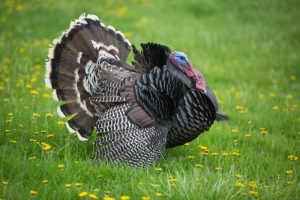Short answer
The average lifespan of a turkey is around 5 to 10 years.
Life expectancy
The average life span of a turkey bird can vary depending on a few factors, such as whether it is a wild turkey or a domesticated turkey. Generally, wild turkeys tend to live shorter lives than their domestic counterparts. Wild turkeys typically have an average life span of around 3 to 5 years in the wild. This is mainly due to the numerous predators they may encounter, such as coyotes, foxes, and eagles, as well as factors like disease and harsh weather conditions.
On the other hand, domesticated turkeys have a slightly longer life expectancy. They are bred and raised under controlled environments with access to proper nutrition and protection. Domestic turkeys typically live for around 4 to 8 years, although some can live longer. However, it's important to note that the life span of domestic turkeys raised for meat production tends to be significantly shorter, as they are bred to reach market weight quickly.
Factors like genetics, diet, and overall well-being can also influence the life span of turkeys. Proper care, adequate nutrition, and a safe environment can contribute to extending the average life span of both wild and domesticated turkeys.
Some interesting facts about Turkey (bird)
-
The wild turkey, commonly found in North America, is not native to Turkey. It was mistakenly named after the country by early European settlers who believed it originated from there.
-
Turkeys are highly adaptable birds and can live in a range of habitats, including forests, grasslands, and mountains. They are particularly well adapted to roosting in trees at night to protect themselves from predators.
-
Male turkeys, known as toms, display an impressive courtship behavior called strutting. During strutting, the tom fans out its tail feathers, puffs up its body, and drags its wings while making a distinctive gobbling sound. This display is aimed at attracting female turkeys, known as hens.
-
Turkeys have excellent eyesight during the day but relatively poor night vision. However, they have an exceptional ability to see ultraviolet light, which helps them identify potential predators' urine marks and navigate their environment more effectively.
-
Despite their seemingly heavy build, turkeys are actually agile flyers. While they spend most of their time on the ground, they are capable of short bursts of flight, usually to escape from danger or to reach their roosting spots. Wild turkeys can fly at speeds of up to 55 miles per hour (88 kilometers per hour) and travel up to one mile (1.6 kilometers) in a single flight.
Summary
Turkeys, the domesticated birds often associated with Thanksgiving, have an average lifespan of around 10 years. However, some turkey breeds can live up to 15 years or longer. Factors that can influence their lifespan include their living conditions, overall health, and genetic factors. With proper care and a suitable environment, turkeys can thrive and live a relatively long life.




